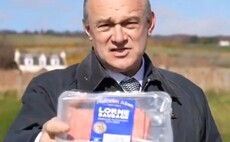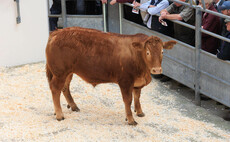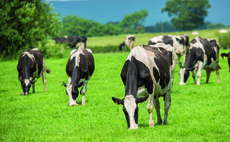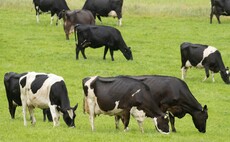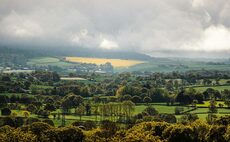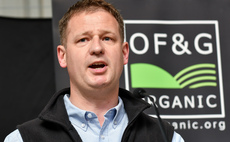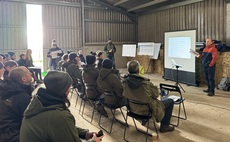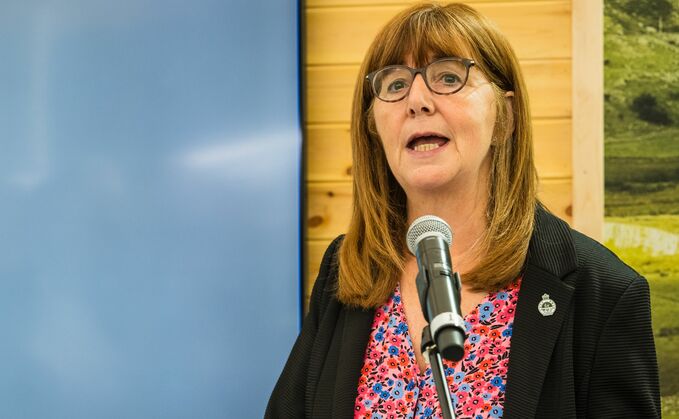
Wales' Rural Affairs Minister, Lesley Griffiths has defended the Sustainable Farming Scheme (SFS), insisting the policy will ‘safeguard our farmers and farming for future generations.'
Listen to the full interview with Lesley Griffiths and chief reporter Rachael Brown below.
Ms Griffiths was speaking to Farmers Guardian amid the growing unrest over the agricultural transition in Wales which this week saw 30 tractors block the roads around the minister's Wrexham office.
She said whilst peaceful protests were legal, criminal damage was 'not acceptable.'
Protests
See also: Welsh farmers say enough is enough at Carmarthen meeting
Farmers have also gathered in their thousands at local meetings to voice their concerns and despair at ‘unworkable' farming policies including SFS, bTB and NVZ.
Welsh farming
Yet despite the obvious unpopularity of the agricultural proposals, Ms Griffiths said she was ‘listening to farmers' and ‘understands' they are worried about their future. She also pointed out that in terms of a final farming policy, there was ‘still a long way to go'.
"I am sure there will be changes. I have never participated in a consultation where there has not been changes come forward. Nothing is going to happen until we have seen all the responses to consultation.
"Farmers know I have always been a minister that listens. If anybody wants to contact me, I am readily available on emails. I am meeting with unions, stakeholders and individual farmers on a regular basis," she said.
See also: It is a 'scary time' to be a farmer in Wales
Sustainable Farming Scheme
Proposals for the SFS are currently undergoing a final consultation.
But at a recent FUW member meeting in Pwllheli, out of the 76 farmers who attended, only six expressed an interest in joining SFS. When these figures were put to the Minister, she said she was 'concerned', adding she wants every farmer to be able to part of SFS.
"I would not be happy if we had less numbers in SFS than BPS. My ambition is for SFS to reach out to farmers that were not part of BPS."
Tree planting
One of the initial ‘stumbling blocks' when the scheme was mooted in 2017, was the demand for 10 per cent tree planting alongside a habitat restoration target. Unions and farmers, particularly in the tenanted sector, have repeatedly objected, calling on ministers to think about the land many Welsh farmers farm, its suitability for tree planting and impractical environmental schemes.
And while the Welsh Government has amended timelines and offered some mitigation regarding soil and location, it has remained resolute in its demand for 10 per cent, leading many farmers to question whether ministers are in fact listening at all.
See also: Tree planting not the only way to reduce emissions in Wales, says union
She said: "[The 10 per cent] in the scheme consultation, I am not saying we will not budge, to use your own words, the most important thing is that we need to look at all consultations."
Nitrate Vulnerable Zones
Tudur Parry is a dairy, beef and sheep farmer from Caernarfon. He said he will not be entering the SFS as the 28 hectares which would be needed to go into the scheme for trees and habitat would amount to the same acreage required to comply with the nitrogen unit levels stipulated by Welsh Government. According to Mr Parry, for a dairy farmer, ‘the schemes contradict one another'.
See also: Bovine TB 'front and centre' for Wales Chief Veterinary Officer
Farming Unions
In response, the Minister said there may be 'unintended consequences' of the schemes which she said again was part of the consultation process and would be 'looked into'.
Abi Reader, deputy president of NFU Cymru said it was vital that farmers and other stakeholders ensured they replied to the current consultation.
"People have made a very powerful show of how they are feeling but we cannot lose sight of the fact that we must respond to Government. We have to let them know," she said.
Welsh Government
Ms Griffiths said she planned to speak to both NFU Cymru and Farmers' Union of Wales (FUW) over the coming days to discuss the current consultation and potential next steps.
"I am sure there will be common themes, but also maybe the farming unions will bring something different to the table. I look forward to that meeting," Ms Griffiths said.
















